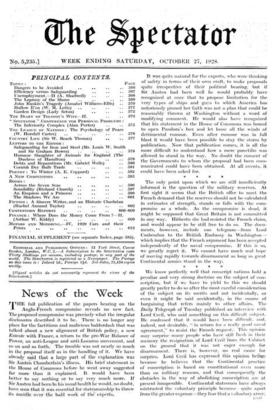News of the Week
THE full publication of the papers bearing on the Anglo-French compromise reveals no new fact. The proposed compromise was precisely what the irregular disclosures described it to be. There is. no longer any place for the factitious and malicious balderdash that was talked about a new alignment of British policy, a new Entente with Prance, a return to the pre-War Balance of Power, an anti-League and anti-Locarno movement, and so on and so forth: The trouble was .not nearly so much in the proposal itself as in the handling of it. We have already said that a large part of the explanation was Sir AUSten Chamberlain's illness. His brief statement in the House of -Commons before- he went away suggested far more than it explained. , It would have been better to say nothing or to say very much more. If Sir Austen had beenin hisnsuathealth he would, no doubt, have seen that it was essential for statesmanship to throw _ its Mantle • over bard work Of the experts. It was quite natural for the experts, who were thinking of safety in terms of their own craft, to make proposals quite irrespective of their political bearing, -but if Sir. Austen had been well he would probably have recognized at once that to propose limitation for the very types of ships and guns to which America has notoriously pinned her faith was not a plan that could be reasonably thrown at Washington without a word of modifying comment. He would also have recognized that his statement in the House of Commons was bound to _open Pandora's box and let loose all the winds of detrimental rumour. Even after rumour was. in full blast it would have been possible to stay the storni by publieation. Now that publication comes,..it all the more difficult to understand how a mere punctilio was allowed_ to stand in the way. No doubt the consent of the _Governments to whom the proposal had been coin, municated could have been obtained. At alL events, it could have been asked for.
* * * *




















































